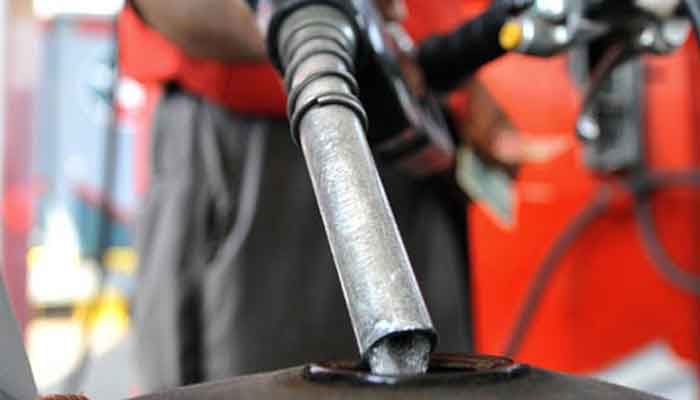- Govt to announce petrol price today for next fortnight.
- Exchange loss adjustment to rob consumers of petrol price cut.
- Current exchange rate is heavily tilted in favour of the dollar.
KARACHI: Due to a sharp rise in the value of the dollar in the last two weeks, the masses may not get any benefit in the prices of petroleum products, according to a The News report.
The report said that the price of diesel is reflecting an Rs34/litre decrease for the next fortnight. The government is scheduled to review the price of petroleum products today.
The international price of crude oil has come down, which can be translated into a major cut in domestic prices of petroleum products, but only if the government passes on the full impact to the end consumers.
However, sources in the oil sector believe that the government would not pass on the full impact of the reduction in the international prices on exchange losses accumulated over the months, which had put the oil sector in a financial crunch.
The government may be deterred to pass on the impact to end consumers, as the oil sector would be in deep financial trouble if their losses are not adjusted on account of sharp exchange rate fluctuations in the past many months.
Diesel price
Oil sector sources told the publication that the ex-refinery price of diesel is showing Rs34/litre decrease for the next fortnight. However, the exchange losses on diesel go over Rs100/litre, which needs to be adjusted.
Sources said that the government may pass on some relief by cutting the diesel price by Rs15 to 20 per litre for the consumers while adjusting the remaining exchange losses.
Sources, however, felt that this was a ripe time for the government to adjust whatever remained of exchange loss adjustment.
The fall in crude prices gave the government enough fiscal space to accommodate the oil companies, which have been facing financial problems as they were not receiving the full amount of exchange losses.
Petrol price
As far as petrol is concerned, its price is showing Rs13-14 per litre decline on the basis of its ex-refinery price in the next fortnight.
Again the exchange loss adjustment may deprive the consumers of the benefit of price reduction and the government may only pass on Rs4-5 relief while adjusting the remaining amount.
Exchange rate
The present exchange rate is heavily tilted in the favour of the dollar. It is a huge hurdle for the government, in terms of reducing the prices of petroleum products in the domestic market.
According to the oil industry estimates, the average exchange rate calculated for the next fortnight is Rs283 to determine the price of the ex-refinery.
Pakistan’s oil sector has repeatedly requested the government in many letters to resolve the exchange losses issue, with few players in the industry pleading to make it more fair and transparent.

 Business2 days ago
Business2 days ago
 Latest News2 days ago
Latest News2 days ago
 Business2 days ago
Business2 days ago
 Latest News2 days ago
Latest News2 days ago
 Business2 days ago
Business2 days ago
 Business3 days ago
Business3 days ago
 Entertainment2 days ago
Entertainment2 days ago
 Latest News3 days ago
Latest News3 days ago























